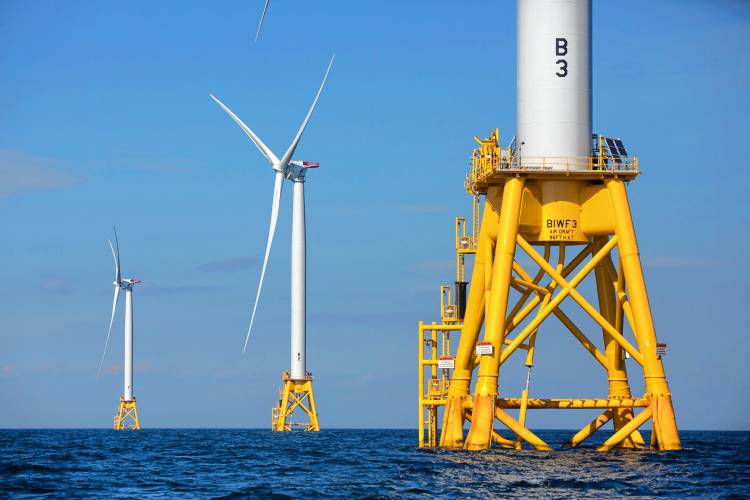UMass will take lead on offshore wind effort with $11.9M center

In this Aug. 15, 2016 file photo, three of Deepwater Wind’s five turbines stand in the water off Block Island, R.I, the nation’s first offshore wind farm. AP FILE PHOTO/MICHAEL DWYER
|
Published: 02-12-2024 10:09 AM
Modified: 02-12-2024 1:31 PM |
AMHERST — UMass Amherst will lead a new $11.9 million center on offshore wind education, research and outreach to expedite development of offshore wind energy and train a national workforce to install and maintain the clean energy infrastructure.
Backed by the U.S. Department of Energy, the Academic Center for Reliable and Resilience of Offshore Wind (ARROW) is a five-year effort to design equitable, resilient and reliable offshore wind to meet the Biden administration’s goal of developing 30 gigawatts of offshore wind by 2030.
“Massachusetts has really over the past decade proven itself to be a real leader in offshore wind and renewable energy in the government, workforce development and industry side,” said Sanjay Arwade, director of ARROW. “We really feel that for the commonwealth, this university-led center is a really meaningful and big piece of completing the picture of Massachusetts’ leading role in offshore wind nationally.”
Arwade defines reliable and resilient offshore wind as systems that continually produce energy as designed and bounce back quickly from disturbances such as storms and blackouts. He said an equitable offshore wind system distributes the infrastructure burden and benefits of the systems evenly, compared to interstate highway systems that often place more burden on underprivileged communities without as many benefits.
The offshore university-led program has three goals. The first is to establish comprehensive offshore wind training and education in U.S. institutions. This includes various types of educational programs and training, from multidisciplinary summer intensives on offshore wind for both students and academic experts to Massachusetts Clean Energy Extension programs out of UMass.
ARROW also will allow partnering institutions to swap educational resources and improve instruction for an estimated 1,000 students during the first five years of the center.
“Finally, we will connect strongly with something akin to an internship program to allow students to benefit from educational resources at academic institutions but also ground themselves in the practicality of the industry,” Arwade said.
The center will serve as a research hub for offshore wind. Investigations published by the center will focus on the best offshore wind infrastructure under various uncertainties in atmospheric conditions, changing ocean conditions and usage of power.
Article continues after...
Yesterday's Most Read Articles
“All those systems behave in uncertain ways. Our approach is to quantify those uncertainties to allow decision makers to make well-informed decisions based on qualifications of uncertainties associated with the systems,” Arwade said.
Lastly, the center will engage with various stakeholders in the offshore wind industry, from wind energy companies and grid operators to non-profits and insurance companies. Arwade said outreach efforts will ensure all stakeholders have a seat at the table in shaping the next generation of offshore wind and its workforce.
ARROW will collaborate with 40 other academic institutions, national laboratories, two state-level energy offices and other industry-related groups in Massachussetts, Illinois, Maryland, Washington, South Carolina and Puerto Rico, some of which will contribute funding to the center. A majority of the center’s funding comes from the Department of Energy and the Massachusetts Clean Energy Center.
“Massachusetts is leading the way in offshore wind development and innovation, and we are proud to commit $4.75 million to help build an equitable offshore wind workforce that has the skills to meet the climate challenge,” Massachusetts Clean Energy Center CEO Emily Reichert said in a statement.
UMass was chosen to lead ARROW as the home of the oldest wind energy research center in the country. For almost 50 years, the UMass Wind Energy Center has been leading education, training and research in wind energy, and will continue to do so as part of the ARROW team.
“This major announcement will drive incredible innovation, training the diverse and skilled workforce of tomorrow to achieve our goal of building a net zero emissions economy by 2050,”U.S. Rep. Jim McGovern said in a statement. “I’m excited that the world-class students and researchers at UMass will lead efforts to decarbonize the U.S. power grid and realize the full potential of offshore wind energy,”
Staff Writer Emilee Klein can be reached at eklein@gazettenet.com.

 State Senate budget funds free community college for all
State Senate budget funds free community college for all ‘We can just be who we are’: Thousands show support for LGBTQ community at Hampshire Pride
‘We can just be who we are’: Thousands show support for LGBTQ community at Hampshire Pride Doors open at Tilton Library’s temporary home at South Deerfield Congregational Church
Doors open at Tilton Library’s temporary home at South Deerfield Congregational Church Area property deed transfers, May 2
Area property deed transfers, May 2
